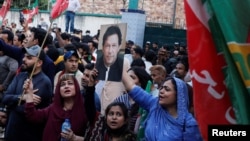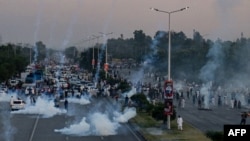Pakistan’s election authorities Friday disqualified populist former Prime Minister Imran Khan from holding public office for allegedly concealing his assets, prompting his supporters to stage nationwide protests and fueling political turmoil in the country.
The ruling alleges that the former cricket star turned politician had made a “false statement and incorrect declaration” about his assets before the Election Commission of Pakistan (ECP).
Khan “consequently ceases to be a member of the National Assembly of Pakistan [the lower house of parliament] and his seat has become vacant accordingly,” the ECP said.
Pakistan Tehreek-e-Insaf (PTI) leaders denounced Friday’s decision as politically motivated and vowed to challenge it in a high court, alleging the election commission transgressed its jurisdiction under pressure from Prime Minister Shehbaz Sharif’s coalition government.
Khan’s supporters took to the streets across major Pakistani cities to protest his disqualification, blocking major highways and clashing with police. There were no immediate reports of casualties.
The case against the former prime minister centered upon a government department known as “Toshakhana"—which literally means “treasure house”—where gifts received by Pakistani leaders during foreign state visits are stored and displayed.
Khan sold several expensive gifts, including luxury watches, he had received and retained, but he allegedly did not report the earnings to the ECP. The hugely popular former leader maintained the earnings in question had been included in his income tax returns and denied any wrongdoing
Recipients are legally allowed to retain gifts above a certain value on payment of 50% of the value, a discount Khan raised from 20% while in office.
His lawyers argued "the election commission is not a court, therefore they can't give a declaration to disqualify anyone.”
The former prime minister was ousted in a vote of no-confidence in April. He has long asserted, without evidence, his removal was orchestrated by the United States in collusion with Sharif and the powerful Pakistani military, which influences politics from behind the scenes.
Both Washington and Islamabad deny this.
More than 130 PTI lawmakers, the largest group in the lower house of parliament, also resigned en masse in April over the ouster of their leader. Khan’s popularity has since surged, and tens of thousands of his supporters have turned out at his nationwide anti-government rallies to call for fresh elections in Pakistan.
Khan’s party has swept subsequent national and provincial by-elections. In the latest round of the election last Sunday, he himself contested seven of the eight National Assembly seats up for grabs and won six of them, underscoring his popularity across the country of about 220 million people.
He has threatened to march with hundreds of thousands of supporters on the national capital, Islamabad, to force the Sharif government into holding early general elections for allegedly ruining the national economy and foreign policy.
Khan has long accused Sharif and his family members, as well as leaders of his major coalition partner, the Pakistan People’s Party (PPP), of siphoning billions of dollars to offshore accounts from kickbacks and commissions they received while previously in power.
Sharif and PPP leader Bilawal Bhutto Zardari, Pakistan’s current foreign minister, reject the corruption charges.
“The election commission delivered justice in the Toshakhana reference. The nation has seen that the post of prime minister has been made a source of personal income through corrupt practices,” Sharif tweeted Friday while commenting on the ruling against Khan.
“He who would spread lies about alleged corruption of his political opponents has been caught red-handed,” Zardari wrote on Twitter.
The election panel in its decision also directed officials "to initiate legal proceedings and take follow-up action” against Khan.
Interior Minister Rana Sanaullah vowed later at a news conference the government would immediately abide by the ECP direction and launch court proceedings against the ousted prime minister.
Friday’s developments come as Pakistan’s economic troubles have deepened following this year’s catastrophic floods. Analysts say increased political instability will likely add to the challenges facing Sharif and his coalition government in addressing rising inflation and balance of payments amid Pakistan’s dwindling foreign exchange reserves.





